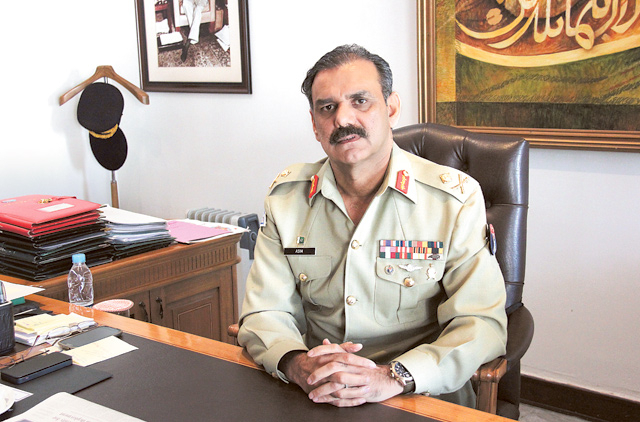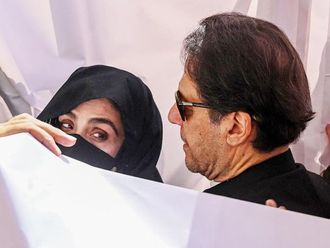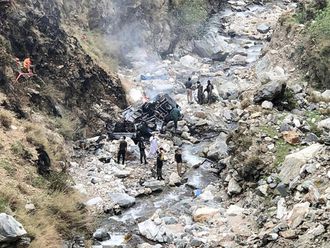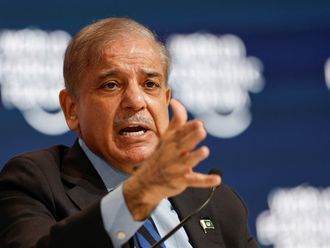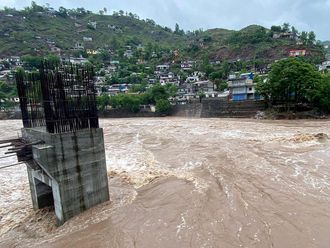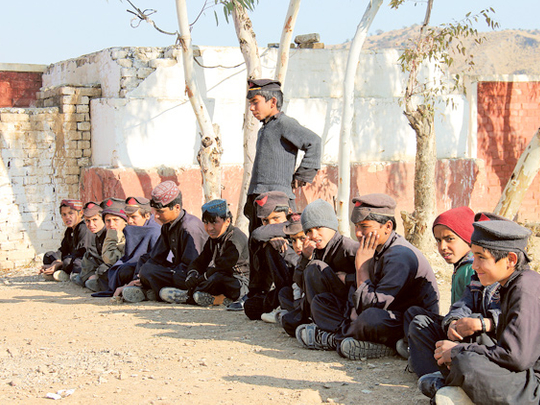
On a recent visit to Pakistan, Gulf News held an exclusive interview with the Director-General Inter Services Public Relations, Major General Asim Salim Bajwa.
The rehabilitation work in South Waziristan following military operations in 2009, the overall security situation in the Federally Administered Tribal Areas (FATA) and the military’s future plans of an operation in North Waziristan were discussed.
Major General Bajwa also gave his views on the Pakistani Taliban’s latest offer for talks and on the strategy to tackle sectarian violence in the country. His Q&A with Gulf News:
Gulf News: In South Waziristan the villages are being rehabilitated phase by phase and the villagers are gradually being allowed to return? When will all the Internally Displaced Persons (IDPs) be able to return?
Major General Bajwa: There were about 41,000 or 42,000 families, which were displaced as a result of terrorism and consequent operations in South Waziristan. The military operation was conceived in four phases and the military strategy was part of the four-phased strategy: ‘Clear’ and ‘Hold’ were the two phases that were to be done by the army. And then there were the other two phases, ‘Rebuild’ and ‘ Transfer’ done by the civilian administration and political government.
As you will have seen the work is now in the third phase but you will have seen the army is still involved because of a lack of capacity that indicates a joint effort towards rehabilitating the entire area.
We still have a large number of IDPs who have not returned. About 50,000 have returned. We can safely say about one fourth of IDPs are back. This year alone 15,000 more families are going back. When we started this in December 2010 we had two options. The first was to take everyone back as we did in Swat or else as a second option, a deliberate, gradual incremental approach but yet sure-footed, so we adopted the latter option.
We surveyed the area, carried out our assessments and then we started this concept of model villages, which was almost rebuilding the areas from scratch. You will have seen the community’s needs are being met through social development, both health and education and then there are the livelihood opportunities, that are coming up. There are some model schools; there is a cadet college.
This area has been devoid of any cadet colleges since 1947; one of the locals’ greatest demands was that they should have a cadet college. So now we have not one but two cadet colleges built in South Waziristan.
There are some areas that still have to be rehabilitated. We are bringing in all the social needs of people for which surveys and assessments have been done. There is an integrated team with the FATA secretariat doing its part but with security being led by the military.
All stakeholders, including donors, are rebuilding the area. But I would like to point out here that one critical development aspect on which we peg the entire rehabilitation project is this road, which passes through South Waziristan. I can tell you now this will bring a silent economic revolution in the area.
The concept is that already there are two strategic corridors from Pakistan to Afghanistan. One through Torkham towards Jalalabad and Kabul and the other through Chaman. This will be the third trade corridor, which will pass through South Waziristan and North Waziristan.
These will then link up with Ring Road in Afghanistan. I think this is a great thing for the people of the area. They will get the ultimate dividends on this side and it will also enhance the trade between the two countries.
What has the UAE contributed in terms of development projects in the affected areas?
There is a group called the UPAP, a UAE Pakistan Assistance Programme, that is regulating the entire funds and overseeing construction. So they are working with the Frontier Works Organisation and the Engineering Corps division, they are working with the military. What is happening is that there are projects that are identified after a survey has been carried out.
We are very grateful to the UAE. Not only is the UAE contributing to the roads but also other social and community projects. There are hospitals, schools and other projects, which the UAE is funding. I know they are also funding one cadet college. There are a number of water supply schemes they are contributing towards. They are sharing the cost and are part of a monitoring system and overwatch system as well.
With the unstable situation in Afghanistan, is not the opening of a third trade corridor with Pakistan — especially one passing through vulnerable areas such as South Waziristan a security threat?
We are not looking at today, at the short term. We are looking at the long term. One way is to wait for absolute peace and stability to come and then start the projects. The other is to build projects to drive peace and stability in this area. So we have gone for the latter.
As the locals are now becoming convinced on their stakes in the projects, their economic stakes, so they are now willing to provide security for these roads. I know with every day passing and, as they see dividends coming, these roads are being used by traders, they will see a lot of economy coming in the area as a spin-off from these roads.
One surprising thing is that South Waziristan is now a weapon-free zone and tribesmen have agreed to give up their arms. How was this made possible?
Since the military is deployed and we are providing security, so, as we are opening all the new areas we are asking them not to carry weapons. They have agreed to it themselves. There are a lot of things, which will surprise you, if you talk to the locals there, you will see their urge to educate children. So it’s good that the area is changing fast. Giving up weapons has proven beneficial to them.
You mentioned that the cadet college was a demand by the locals?
South Waziristan did not have any cadet colleges; there was one in North Waziristan. We saw in every meeting, in every Jirga [tribal assembly of elders] that they would come up with this demand.
Since 1947 they have been demanding a cadet college. So when the chief of army staff was visiting the area and I was commanding there at the time, they put up the demand to him in a Jirga, and he conceded to their demand. The funds were managed and the Cadet College was started in a record time of eight months. So this was how it started.
Would you like to tell us about your experience at the time of insurgency in South Waziristan when you were stationed there?
Militants had control of the area then and executed a kind of brutality on the locals and pushed them towards darkness and illiteracy. The people will narrate stories to you. There was an intense fight that took place when the military operation was decided, it was pushed from south to north, on every height a fight was given. Since they had so many weapons, there was a lot of destruction.
The area was finally cleansed; we sacrificed many soldiers and officers. If you go to CMH Pindi and visit the Armed Forces Institute of Rehabilitative Medicine you will see our officers and men who have been maimed and have lost their limbs. We have paid a very heavy price but Alhamdulillah, ultimately we cleared the area and we are in the process of rebuilding. So if you speak to locals they never want them to return.
I may tell you here that if you carry out a survey of these terrorists who were from these tribal regions they are not even half a per cent. More than 99.5 per cent of people from the area are peace-loving and progressive tribal people who want to educate their children and want more livelihood opportunities. They want their area to develop, and for this I suggest when you go next, speak to the youth of this area. They have the same aspirations as other young boys everywhere else.
What are the top sectors that need the most focus and help from the international community?
I would say that maximum attention must be given to the social sector. We should focus on education, health and livelihood. I would say if we have to prioritise it should be livelihood and education. Because we also have to feed the current generation and the older generation and build the youth, where the future lies for that area. They have all the potential. We have seen those models working so we must educate future generations. These boys can do as well as any boys anywhere in the world.
Do you feel there is an emergence of a positive trend regarding girls’ education in the area?
It is a very heartening thing because the locals decided among themselves and then the Jirgas started coming and saying that they want schools for girls. So we have started building more schools. So I would urge all our friends to invest more in education.
Pakistan has been pressured a lot to launch an operation against insurgents in North Waziristan. Is this imminent?
Pakistan has been pressured a lot, and it has not taken any pressure or dictation to launch an operation in North Waziristan. Pakistan’s stance always was that we would carry out the operation when it suits us. So we will take our own decision in our own interests.
Therefore, a comprehensive plan was worked out. We started from Swat, which is a model operation and is being studied across the world. It is a success model, which we decided to replicate in other agencies. It was very logical to start from the North in areas adjacent to Swat.
So then came Bajaur, then parts of Khyber were cleared. Then it was realised that when you move to Khyber there are some inaccessible areas, then the Kurram and Orakzai operations were carried out.
The South Waziristan operation was carried out as well before these agencies. Currently, there is a fight going on in some pockets, which is Orakzai East and Khyber West, this is one pocket and the other remaining bigger pocket is North Waziristan. So it is very much part of the campaign plan. When it will happen is a political decision and also in the scheme of things.
The Swat operation received a lot of public support. Is this important for the success of a military operation?
The strength of military operations is rooted in public support. There is no doubt about that. That’s why it has to be a political decision as all major operations carried out in the past. With political decision comes population support. That’s why it will be decided at the political level and the military will carry out the operation.
When you are carrying out operations in border areas, do you have a coordination mechanism with the International Security Assistance Force in Afghanistan to prevent help from insurgents from the border?
Both sides carry out operations in respective areas, they continue to carry out their operations, we carry out ours. We want very much to do that. That is why we have cross-border cooperation. We do inform them that we are carrying out an operation in some areas adjacent to a border, depending on what they have, there are various responses in various cases.
Coordination is getting better, because of the exchange of liaison officers (LOs), there is improved coordination through a border control mechanism. That’s becoming more effective, there is an exchange of LOs on both sides and there are posts now that are being built on the border.
In view of the recent arrest of Maulvi Faqir Mohammad in Afghanistan, will he be handed over to Islamabad? Is there any strengthening of cooperation between Islamabad and Kabul?
This is something that has been going on for some time. We have been talking to each other at various levels, at foreign office level and at the military level. The effect will come when actually some people will be handed over to us. So far no one has been handed over, we have also heard reports of his arrest.
We are asking them to hand over people that are actually maintaining sanctuaries in Afghanistan. There are sanctuaries in Kunar and Nuristan province, and there are terrorists in those sanctuaries that are carrying out cross-border terrorist attacks, especially on the Dir side and also on the Bajaur side. Actually a few months back they intruded into a valley in Bajaur and were thrown out. They ran out of the valley and left behind a lot of dead bodies, we keep pursuing them.
Pakistan released some high-level Taliban and Kabul criticised the move?
It is important to understand the mechanism that was adopted. There were discussions between all stakeholders and this was on the recommendation of the Afghan government. It was decided with Pakistan’s Foreign Office who was to be released and how they were to be released. It was done after due diligence and discussion. However, if they did not go back to Kabul and the Afghan government has not been able to monitor them then Kabul should be posed this question.
While the government has been speaking out against drone strikes, the fact that these are being carried out does not speak well for its credibility. Is there any change in strategy to get the United States to give Pakistan drone technology or adopt a different counter-terrorism strategy?
The trust factor is first. I don’t know what else can Pakistan do to win somebody’s trust; we have been a coalition partner for so long. Pakistan has been a country that has suffered the most from terrorism and contributed the most towards fighting terrorism, so this is something that needs to be understood. Secondly our stand on drone strikes is known.
There is a joint resolution of parliament, which condemns drone strikes and raises the topic of sovereignty. This is exactly what everyone in Pakistan feels. The foreign office has been protesting this and has taken it up all the time. It has also called the US ambassador and lodged Pakistan’s protests.
Is there a more comprehensive strategy to counter and target sectarian militant outfits in the wake of the Quetta killings?
Baluchistan is a very complex case right now; there are separatists’ elements that are operating. Everyone has been fighting them out. I am talking about the political government that has been there for the past five years. Then there is the sectarian issue, which has come up and has intensified in the last few months.
There are some decisions that have been taken, these will be intelligence driven and Frontier Corps (FC) led operations which will be integrated involving the police and Reserve Police and Baluchistan Constabulary. They are all going in an integrated form after these terrorists. All intelligence agencies are supposed to complement these efforts.
One thing I want to raise here is that when we talk about intelligence, the best form of intelligence in an urban environment, especially here or in any country, is police intelligence. I feel there were some deficiencies in the police intelligence system but now there will be an integrated effort.
What is the military perspective on the Taliban’s offer for peace talks? Why has this offer come at this point? Is it because the TTP [Tehrik-i-Taliban Pakistan] are looking for an opportunity to regroup or is it because a North Waziristan operation is in the offing and they are trying to buy time?
I can only say that they have violated all previous deals. You are witnessing a government response, it is for the political government to decide whether and if they are carrying out a dialogue and to what end. We have been mandated to fight terrorism and we will continue to fight terrorism. When the political government asks our input we will give our input.
A big concern has been the recent India-Pakistan border tensions. What can be done to build confidence and avoid such incidents on the border which could lead to war, something both states, nuclear powers must be cognisant of?
The two militaries are deployed and sitting very close, eye to eye along the Line of Control. This recent incident was very sad. They tried to raid one of our posts; they intruded into our area and killed our soldiers.
This spiralled an outcry in Pakistan; the whole nation was galvanised and standing together behind the military. This is sad, and while we agree this should not happen but if there is such an enunciation of this kind they will get a fitting response.
There was a meeting at the local level and then at the GHQ level we had an exchange of telephone calls, a hotline between the director-generals of military operations. Then later the two Foreign Offices were in touch, there were exchanges at the diplomatic level and also political statements on both sides.
There was a ceasefire for so long and it stayed effective as well, now suddenly there was a violation from their side, their media really hyped up things. That was sad and if they do that then how can you control things? They will spin out of control.
I would like to highlight here that there is a need to resolve core issues, the same reason why the two militaries are sitting there. There is progress in trade; people-to-people contact, but until core issues are resolved these things will keep happening.


